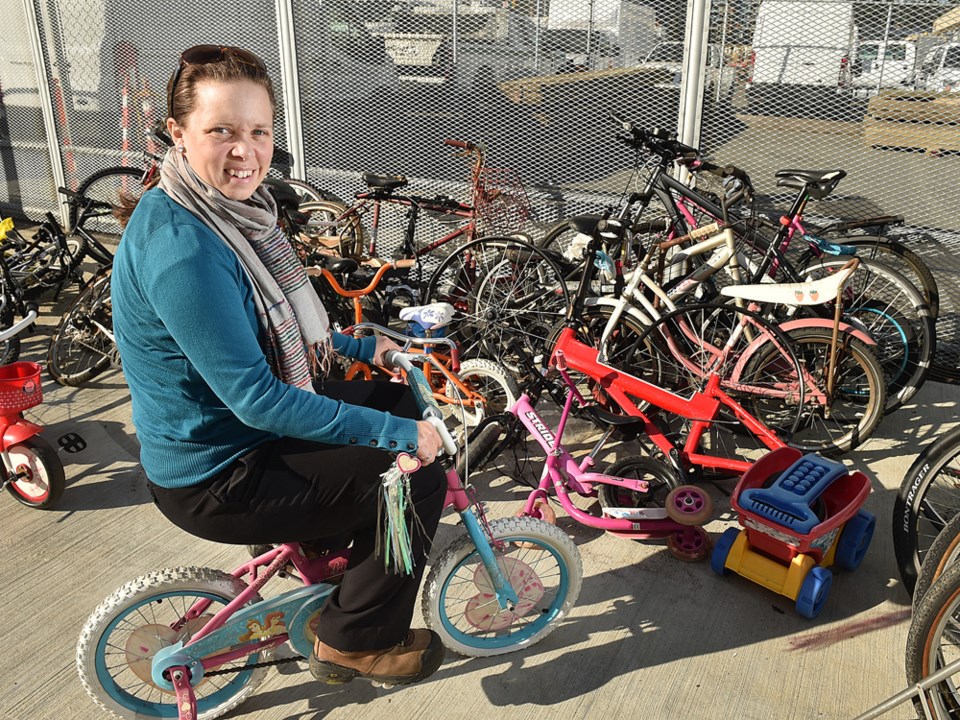A trio of Vancouver non-profit bicycle shops has partnered with the city in a unique program to recycle old bikes and donate or sell them for a low price to people who can’t otherwise afford to buy a two-wheeler.
Kids, students and temporary foreign workers have all benefited from the program that quietly began in July with the aim of keeping bikes dumped at the city’s transfer station out of the landfill and into the hands of people who can fix them.
The program, which involves Our Community Bikes, Kickstand and The Bike Kitchen, is the brainchild of Sarah Willie, a city zero waste manager, who is clearly passionate about keeping bikes from an early death and promoting the little-known recycling program.
“For me it’s the last line of defence,” she said, standing in the city’s new recycling depot that opened three weeks ago. “I would hope that if somebody looks up where to donate your bike, your first stop would be one of those local community spots. But if you come here and you’re thinking about throwing it away because you didn’t think about that option, or you didn’t know about that option, then we can set it aside.”
On the day of the Courier’s visit to the depot, which is on Yukon Street near the Marine Drive Canada Line station, three bikes had recently been dumped, including a small bike in decent shape suitable for a five-year-old child, an older pink Norco women’s bike in need of some repair and a very fixable Kona electric bike with shocks and disc brakes.
As the pile of bikes grows, Willie will connect with a coordinator working on behalf of the three shops to pick up the two-wheelers and drop them off at all or one of the locations, depending on need and space available at the shops. Some of the bikes, she acknowledged, are too far gone to be recycled.
Our Community Bikes is located on Main Street, Kickstand is at Venables and Commercial Drive and The Bike Kitchen — a project developed by the University of B.C’s Alma Mater Society bike co-op — is based at the university.
Sunny Nestler, programs manager of the co-op and Bike Kitchen, said refurbished bikes have gone to children, people who can’t afford a bike, students who only need a bike for a couple of years and temporary foreign workers employed on farms in the Lower Mainland.
“It’s going really well,” Nestler said. “We have diverted several truckloads of bikes and parts from the landfill.”
By “truckloads,” she means 50 bikes were collected from the city’s recycling depot from last July to January of this year. Of the 50 bikes, 21 were either sold or donated. Others were used for parts or the re-sale of parts.
Prices for a bike at The Bike Kitchen can range from $20 to several hundred dollars, depending on the type of bike, the make and the work and parts that went into getting it road ready, said Nestler, noting there are plans this summer to better advertise the city’s recycling program.
“Ideally, the program will make itself irrelevant because people will know they can just bring bikes directly to the community bike shops rather than bringing them to South Vancouver and trying to throw them away,” she said. “For now, this is kind of how it’s working.”
Mayor Gregor Robertson, an avid cyclist and owner of an old Rocky Mountain bicycle, was at the city’s new recycling depot March 1 to officially open it to the public. Robertson said the recycling service, along with a variety of measures the city has put in place over the years, is another initiative to help the city reach its goal of becoming the “greenest” city in the world by 2020.
“I think it’s great,” he told the Courier after the news conference, where he also noted cooking oils can now be dropped off at the depot. “Lots of people are choosing to ride bikes now, and it’s good to have a more affordable way to get on a bike and know that you’ve kept it out of the landfill, too.”



